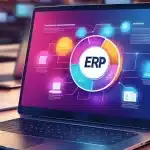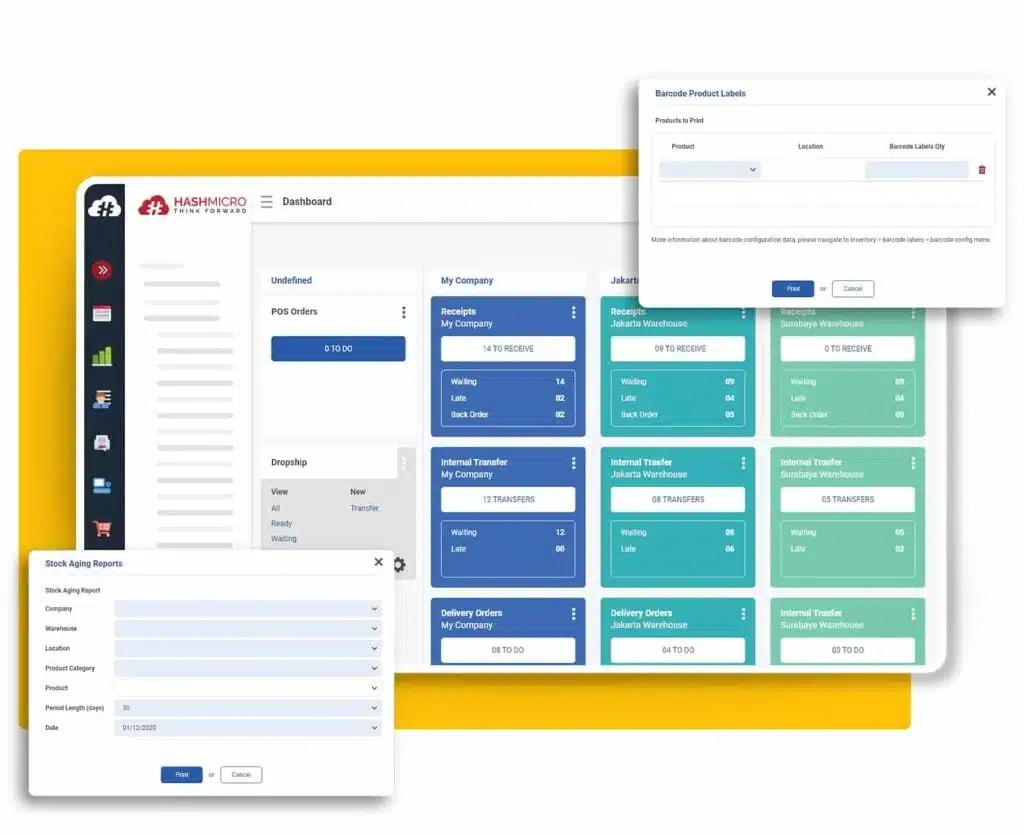In the business operations and logistics field, effectively managing the flow of goods and information is critical to maintaining efficiency and competitiveness. With the advancement of technology, businesses now have access to a variety of software solutions designed to optimize processes and increase productivity.
Among the most common options are Enterprise Resource Planning (ERP) systems and Warehouse Management Systems (WMS). However, what exactly are WMS and ERP, and how do they differ? Which one, ERP vs WMS, is the ideal solution for your specific needs?
While ERP and WMS software may seem similar at first glance, recognizing the key differences between them is key to making the right decision for your company. In this article, we will discuss the advantages of each system and determine which one would better suit your business based on its unique needs.
Table of Contents

Key Takeaways
|
What is ERP?
Before going deeper, let’s start the ERP vs WMS discussion by first discussing what an ERP system is in depth.
Enterprise Resource Planning (ERP) solutions are comprehensive software systems designed to help businesses manage and streamline their daily operations more effectively. Serving as a central hub, ERP software gathers and organizes data from various departments such as finance, human resources, procurement, and inventory management.
By integrating these functions into one unified platform, ERP enables companies to gain a holistic view of their operations, facilitating more informed decision-making and promoting operational efficiency. In addition to improving overall efficiency, ERP systems play a pivotal role in driving business productivity and supporting long-term growth.
These systems offer the flexibility needed to adapt to evolving business needs, whether it’s expanding operations, launching new product lines, opening additional locations, or adhering to new regulatory requirements.
ERP solutions are highly configurable and customizable, allowing businesses to tailor the system to their specific goals and operational demands. Ultimately, ERP simplifies complex operations, making it an essential tool for businesses seeking to maintain competitiveness and streamline their processes.
Curious to explore the best ERP system? You can read our previous article that discusses various best ERP software.
What is WMS?
Previously, we discussed the definition of ERP. So, next we will continue the discussion of ERP vs WMS by discussing the definition of WMS itself.
A Warehouse Management System (WMS) is a software solution designed to help businesses efficiently manage and control their warehouse operations. It offers tools and features that assist in organizing and monitoring inventory, handling incoming and outgoing shipments, and optimizing various warehouse processes.
In simple terms, a WMS functions as a digital assistant for warehouses, aiding managers and staff in keeping track of warehouse activities. A typical ERP-integrated WMS includes functionalities such as barcode scanning, inventory tracking, order management, and optimization of picking and packing processes.
By automating these tasks and providing real-time insights into inventory movements, it ensures that products are accurately located and dispatched at the right time. Ultimately, a WMS enables businesses to effectively manage their inventory, minimize errors, and enhance productivity within the warehouse environment.
Curious to explore the best WMS system? You can read our previous article that discusses various warehouse management systems Philippines.
ERP vs WMS, What’s the Difference Between Them?
After reading each definition of WMS and ERP. However, you may still feel confused as to what the fundamental differences are between the two. Differences such as functionality, feature coverage, and scalability. Therefore, we will present the fundamental differences between the two below:
Main focus
ERP system are designed to handle various aspects of business operations, including finance, human resources, purchasing, production, and inventory management. The main goal of ERP is to integrate all business functions into a single platform, thus providing comprehensive visibility and facilitating better decision-making across the enterprise.
In contrast to ERP, WMS software specifically focuses on managing warehouse operations. It optimizes goods storage, shipping, and receiving, and ensures efficient use of warehouse space. WMS system aims to manage inventory and goods movement with precision, specifically within the warehouse.
Scope of functions
The second difference of ERP and WMS lies in its functionality. ERP systems provide a comprehensive solution for managing the entire business process, covering various departments such as accounting, HR, marketing, production, and inventory. ERP brings together data from all areas of the business, creating an integrated flow of information for easy coordination between divisions.
On the other hand, WMS system is limited in focus to warehouse management. WMS software manages logistics operations such as goods receiving, storage, picking, packaging, and shipping. While WMS software can be integrated with ERP, its functions remain centered on inventory management and warehouse operations.
Scalability
In terms of scalability, ERP can be adapted to evolving business needs. Whether it’s business expansion, adding new locations, or changing regulations, ERP has the ability to evolve with the company.
On the other hand, WMS software is also scalable, but its scalability is more focused on inventory volume and storage space. WMS system helps businesses that have growing logistics by ensuring that warehouse space is used as efficiently as possible and that inventory is always accurate.
Key benefits
Key benefits of ERP include better operational visibility, faster and more informed decision-making, and reduced data duplication. With ERP, all information from various departments can be accessed in real-time by management, enabling more effective strategies.
WMS system offers benefits in terms of more accurate inventory management, reduction in shipping errors, and improved warehouse operational efficiency. WMS system also helps in maximizing storage space and ensuring that products are always available to ship when needed.
Impact on business processes
As a system, ERP affects the entire business process, from production to sales. With ERP, companies can ensure that every aspect of their business is interconnected and managed efficiently, ultimately improving the overall performance of the company.
WMS software, on the other hand, directly impacts the efficiency of warehouse and logistics operations. The system ensures that the flow of goods in the warehouse runs smoothly, reduces storage costs, and improves customer satisfaction by ensuring timely delivery.
ERP vs WMS, Things to Consider Before Choosing
When choosing between an WMS and ERP, it’s important to consider several factors based on your unique needs and priorities. While customization options are available, it’s essential to clearly understand the core features and functionalities that the selected system should provide.
Below are key considerations to guide your decision-making process:
Business needs
Every company has different needs, depending on its size, structure, and operational complexity. ERP (Enterprise Resource Planning) is a comprehensive solution for managing various aspects of a business, including finance, human resources, inventory management, and production.
ERP systems are suitable for companies that want to integrate all business processes into a single platform, allowing for comprehensive visibility and automation of processes across departments. In contrast, a WMS (Warehouse Management System) focuses exclusively on warehouse operations management.
If a company needs more efficiency in storage, shipping, and stock management, a WMS may be more relevant.
Budget
ERPs are typically more expensive due to their extensive, enterprise-wide features. ERP implementation, training, and maintenance costs can be quite high, and it often requires additional resources to ensure its optimal use.
On the other hand, a WMS is a more specific and often more cost-effective solution as it focuses solely on warehouse management. If a company only has limited needs in terms of inventory and warehouse management, choosing a WMS can provide better cost efficiency compared to an ERP.
Adaptability
ERP is designed with a more rigid structure to ensure stability and consistency across the enterprise. However, this makes ERP less flexible in handling sudden changes or non-standard scenarios. The customization process in ERP often requires considerable time and cost.
In contrast, WMS is more flexible when it comes to adapting warehouse operations, as it is designed to handle real-time changes in inventory and workflow. If a company needs a system that is able to adapt quickly to changes in daily operations, WMS can be a more flexible solution than ERP.
By considering all the factors above, companies can more easily determine whether ERP or WMS is the most appropriate solution for their operational needs.
Read more: WMS vs. SCM: A Guide to Key Differences and Functions
Boost Your Productivity with a Comprehensive System from HashMicro!
Regardless of your needs whether it is ERP or WMS, HashMicro is the best software provider vendor with comprehensive features to offer. As a company that focuses on business automation, HashMicro offers a variety of cloud-based applications designed to help companies improve operational efficiency, productivity, and overall business management.
The ERP system provided by HashMicro includes various modules that can be customized according to the specific needs of the company, such as financial management, human resources, inventory, sales, and project management. With full integration between modules, HashMicro’s ERP system enables better visibility and control across business departments.
HashMicro’s ERP system also boasts extensive scalability to enable it to work optimally as the company grows over time. Furthermore, HashMicro does not impose limits on the number of users which can increase transparency in business management.
In addition to ERP, HashMicro also provides a WMS (Warehouse Management System) specifically designed to optimize warehouse operations. This WMS system assists companies in inventory management, order processing, storage space organization, and real-time tracking of goods, thereby increasing warehouse efficiency and reducing the risk of errors.
With the latest technology, HashMicro provides a scalable and flexible solution, allowing companies from various industries to customize the system according to their needs. In addition, HashMicro also offers a free demo for companies who want to get a comprehensive overview of the dashboard and system features before making a purchase.
Conclusions
In conclusion, both Enterprise Resource Planning (ERP) systems and Warehouse Management Systems (WMS) are essential for enhancing business operations and logistics. ERP systems are designed to integrate and manage core business processes across various departments, offering a holistic view of overall operations. Meanwhile, WMS focuses on optimizing warehouse operations with specialized features for inventory management and warehouse efficiency.
When choosing between ERP and WMS, it’s important to evaluate the unique needs and priorities of your business. If you’re unsure which ERP solution is right for you, HashMicro provides customizable ERP systems and advanced WMS solutions.
You can also take advantage of their free demo to explore the dashboard and gain insights before making your decision.
























